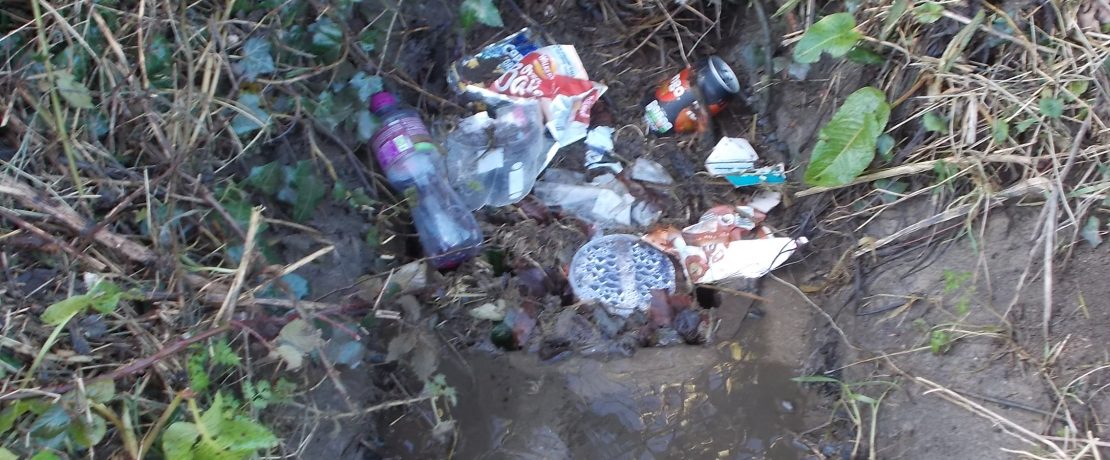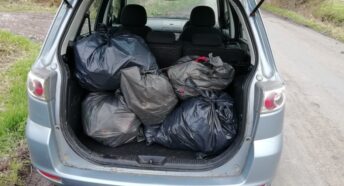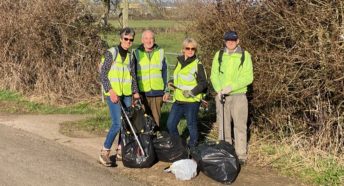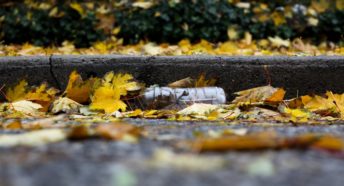Roadside litter-a growing shame – by Martin Roundell Greene, CPRE volunteer
If you’re worried about the amount of litter strewn along our roadside verges, so am I. And if you’re not, maybe you should be. It’s a growing problem.
My photo shows a drain on Kingston Hill near Ilminster. It’s not just what the drain-grill caught that’s the problem. It’s what got through it: the chocolate wrappers and snack packets, coffee-cup covers and Covid masks. They all get washed down into the River Parrett and then on out to the sea.
My wife and I have taken to picking up countryside litter on our daily exercise walks. Now is a good time to do this, in these first few months of the year. The council has cut the roadside hedges and verges back, last summer’s foliage has died away, and new spring growth hasn’t yet appeared. So it’s much easier to spot our prey. Picking it up gives the countryside a fresh start. Not for long perhaps but, curiously, litter left lying seems to be a magnet for more litter while, on a clean stretch, it’s as if new litter is shy and doesn’t want to be the first to join.
What do you need to pick up litter? Well, first some tough gloves, for instance rubberised gardening gloves, are essential. Personally, we don’t use a litter-picking tool because we find the stooping and straightening good exercise, but many volunteer pickers do. You do need a bag: I’ve dedicated a couple of supermarket bags-for-life to the task. And last, for your own safety, a light coat or even a ‘high-viz’ vest makes sense. If you live in Somerset, CPRE Somerset can kit you out with a picker, gloves and hi-viz vest if you commit to a regular litterpick in your local patch. Details here
How much do you pick? That’s up to you of course, but I work by the bag-full: one bag per walk, or two if I’m feeling particularly virtuous (or cross with the tossers). On some stretches of road it’s surprising how quickly a bag fills up.
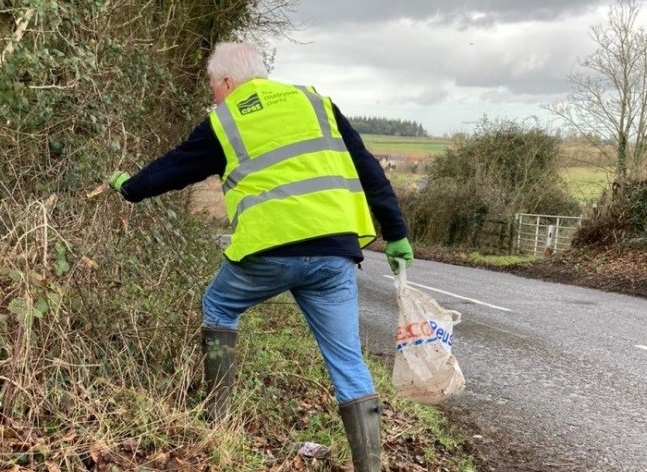
It’s extraordinary what motorists carelessly toss into our green and pleasant countryside. Sweet papers and snack packets, face masks and plastic bottles of course. You’ll find a colourful range of soft drinks cans too. More sobering are the large number of cider and beer cans, and the occasional pre-mixed gin and tonic or whisky and coke. This week I also picked up two vodka, a Napoleon brandy and two whisky half bottles. I imagine the drinkers were disposing of the evidence before getting home. On a less sad note, I also found a baby’s dummy, a pair of reading spectacles, a half-full dispenser of anti-wrinkle lotion and a large black bra.
What’s to be done? How can the tossers be stopped, or at least discouraged? How can they be brought to realise that tossing litter into the countryside is simply unacceptable? Easier said than done. But most people these days accept the need to queue, to let other drivers in, to clean up after their dogs, even to socially distance. It’s not an impossible dream.
First we should make clear that littering in the countryside is a serious offence. So the penalty for dropping litter needs to be serious too. The fixed-penalty charge for littering – even a sweet wrapper – should be raised from its present ‘up to £150’ to ‘up to £1,000’, and this new maximum penalty well publicised. I’d also like to see tossing litter out of a car made a motoring offence so that magistrates have the power to add penalty points to the driver’s licence and also sentence tossers to so many hours of unpaid community work
Catching the tossers is hard. Drivers usually wait until they’re out of town before tossing their rubbish away. One idea would be to require drive-through takeaways to use number-plate recognition software to print customers’ registration numbers automatically onto packaging. The customer who’d bought that coffee cup or burger box could then easily be easily identified. CCTV could be seen to be monitoring littering hotspots. Catching offenders will continue to be difficult, but the greater chance of being caught plus tougher penalties will help get the message across: “The countryside isn’t a dustbin. Take your litter home.”
I’d also like to see roadside campaigns, not permanent but periodic ones like the political ones we see at election: “KEEP BRITAIN TIDY. DON’T BE A TOSSER. TAKE YOUR LITTER HOME”; or “FOR THE KIDS SAKE, KEEP OUR PLANET TIDY”; or maybe just, “LITTER CAMERAS OPERATING HERE. TAKE IT HOME”.
Schools and colleges can help. A series of information films highlighting the damage that littering does to the environment should be part of the curriculum. They need to be interesting, well produced and regularly refreshed. Not old hat. If the message gets through to children, they’ll pass it on to the parents.
Finally, like the speed-awareness courses that speeding motorists can be asked to do, there should be similar litter-awareness courses for motorists caught littering. Or a spell in the stocks being pelted with litter. That would learn them, wouldn’t it?
NB: Views expressed are Martin’s own suggestions and not necessarily agreed CPRE policy. Especially the bit about putting people in the stocks!
